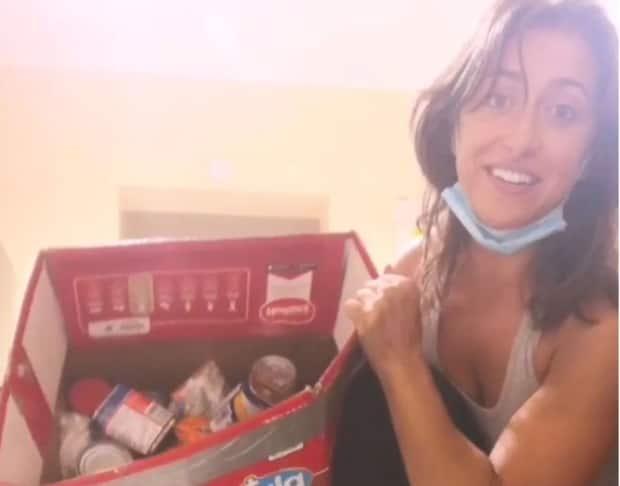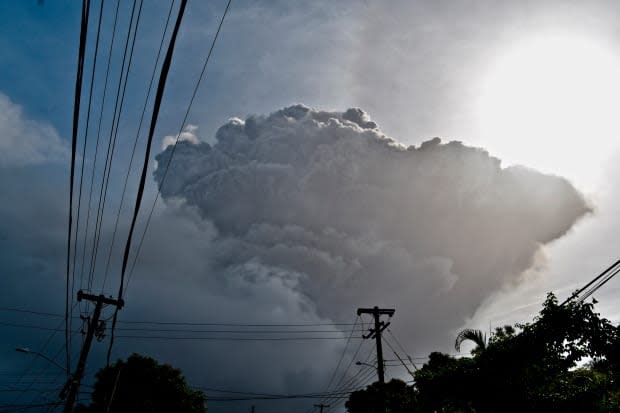Canadian medical students in St. Vincent pull 'all-nighters' to help evacuees after volcano eruptions

Claire Matlock went from handling final exams as a medical student in St. Vincent to helping people devastated by the La Soufrière volcano eruption early Friday — and the volunteer efforts of the Kitchener, Ont., resident and her friends have extended far beyond expectations.
Between 16,000 and 20,000 people have been evacuated from the eruption area in the northern region of the island. Over 3,000 of them are staying at more than 80 government shelters.
Though covered in ash, Matlock was safe, as she lives in the capital of Kingstown in the "green zone down south," which wasn't as heavily impacted as the "red zone" in the north, she said when contacted by CBC News.
Recognizing the desperate need of the thousands affected by the eruption, Matlock, 27, and fellow medical student Anna Vanhoof, 23, of Bowmanville, Ont., quickly started working to help get food and supplies to them.
"There are lots of people off the grid, not in shelters, who need supplies just as well, and that's where my friends and I come in and help fill those gaps," said Matlock.
"As a group of aspiring physicians, it's in our nature to help people, and many of us are finding ways to be of service between studying for final exams."
It was Matlock's social media post that really kicked up their efforts.
That mom that needed formula for her baby now has 10 cases of it today because friends and family back in Canada sent me some money to go to the store and then to her house. - Claire Matlock, Canadian in St. Vincent, on getting supplies to evacuees
Her post said she was heading out to buy food and supplies for people in need — bars of soap and canned goods, for instance, that would get delivered that day. She also said for anyone wanting to send her "five bucks by e-transfer," the money would be put to immediate good use.
"It really took off — we raised thousands of dollars very quickly," said Matlock. "I did not expect that. It's very grassroots.
"It's still just my best friend [Vanhoof] and I here, and our local Vincentian friends who are the real MVPs, because they are the ones navigating us down the back street."
Matlock said people in the red zone are especially in need.
Here are some photos from Claire Matlock of her aid/supplies deliveries in St. Vincent:
"Up north is bad. People have entirely lost their homes — the pyroclastic flows have started," she said about the dangerously hot post-eruption flow of rock fragments, gas and ash.
"All of us all over the island are dealing with the ashfall, and the mess that it makes just infiltrates everything.
"It's like a grey, dusty toxic snowfall … and it leaves a very poor air quality," said Matlock.
She explained how they're getting supplies to those in need.
"It's very simple — we text the shelters, they tell us what they need, we go buy it, deliver it and repeat," she said.
"That mom that needed formula for her baby now has 10 cases of it today because friends and family back in Canada sent me some money to go to the store and then to her house. It's very efficient and it's also a good example of how social media can be used for good, and we're so humbled by all the donations."
1st eruption in decades
Soufrière has erupted before, including in 1979, the last time it exploded before Friday, and in 1902, resulting in the death of 1,600 people.
An eruption Tuesday morning, on the anniversary of the 1979 eruption, was slightly smaller than Monday's that sent deadly clouds of hot gas, ash and stone down the mountainsides.
No casualties have been reported since the first big blast early Friday, but island leaders Tuesday estimated the eastern Caribbean island will need hundreds of millions of dollars to recover from the eruption, as ashfall and the pyroclastic flows have contaminated water reservoirs and destroyed crops.
Volcanologists say activity from Soufrière could continue for weeks.

Garth Saunders, minister of the island's water and sewer authority, said some communities have not yet received water.
"The windward [eastern] coast is our biggest challenge today," he said during Tuesday's news conference, about efforts to deploy water trucks. "What we are providing is a finite amount. We will run out at some point."
The island's prime minister, Ralph Gonsalves, said people in some shelters need food and water, and he thanked neighbouring nations for shipping items including cots, respiratory masks, and water bottles and tanks.
In addition, the World Bank has disbursed $20 million US to the government of St. Vincent as part of an interest-free catastrophe financing program.
"We have to get stuff rolling in to people," Gonsalves told a news conference on the local NBC Radio station.
Students hope exams get postponed
Matlock said it's taken a lot of preparation for her and her friends to keep going through the chaos.
"We try to go [to get supplies] as early as we can between exams," she said. "The hardest one to find is water right now. Those are stripped off the store shelves, so whenever the pipes come back on, all of us fill up. But we've resorted to boiling water from the pool for cooking or bathing, and we're just doing our best with what we have."
She also said she and fellow medical student are "pushing for [finals exams] to be postponed."
"We're pulling all-nighters here, but it's hard to focus. It's hard to buckle down because as future physicians you have to study for 12 hours a day with your head in a book, and it's hard to study every bone in the body when things outside are so broken and all of us want to help.
"We're hoping that they postpone them, but until anything is official we have to continue to study," added Matlock.


 Yahoo Movies
Yahoo Movies 